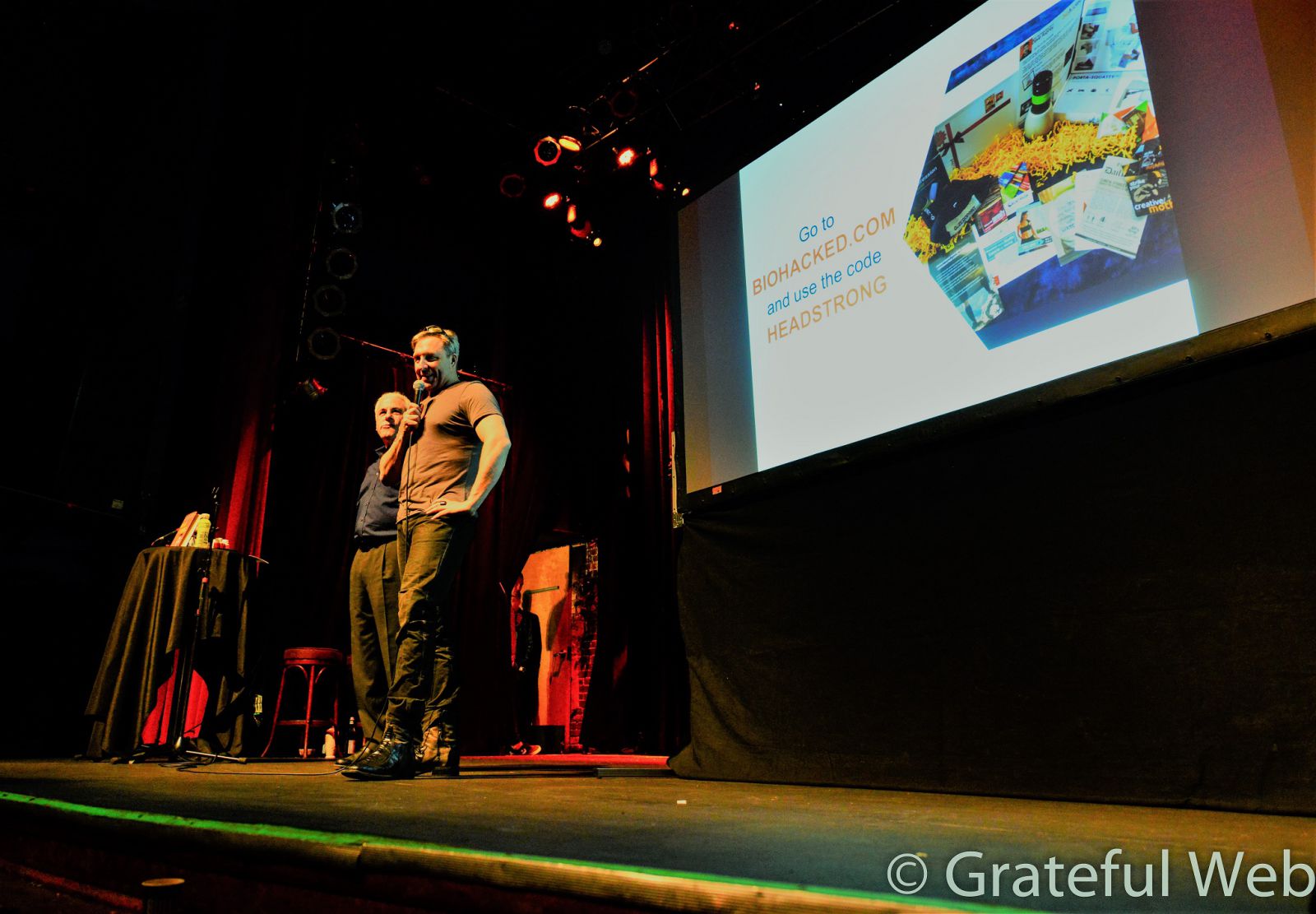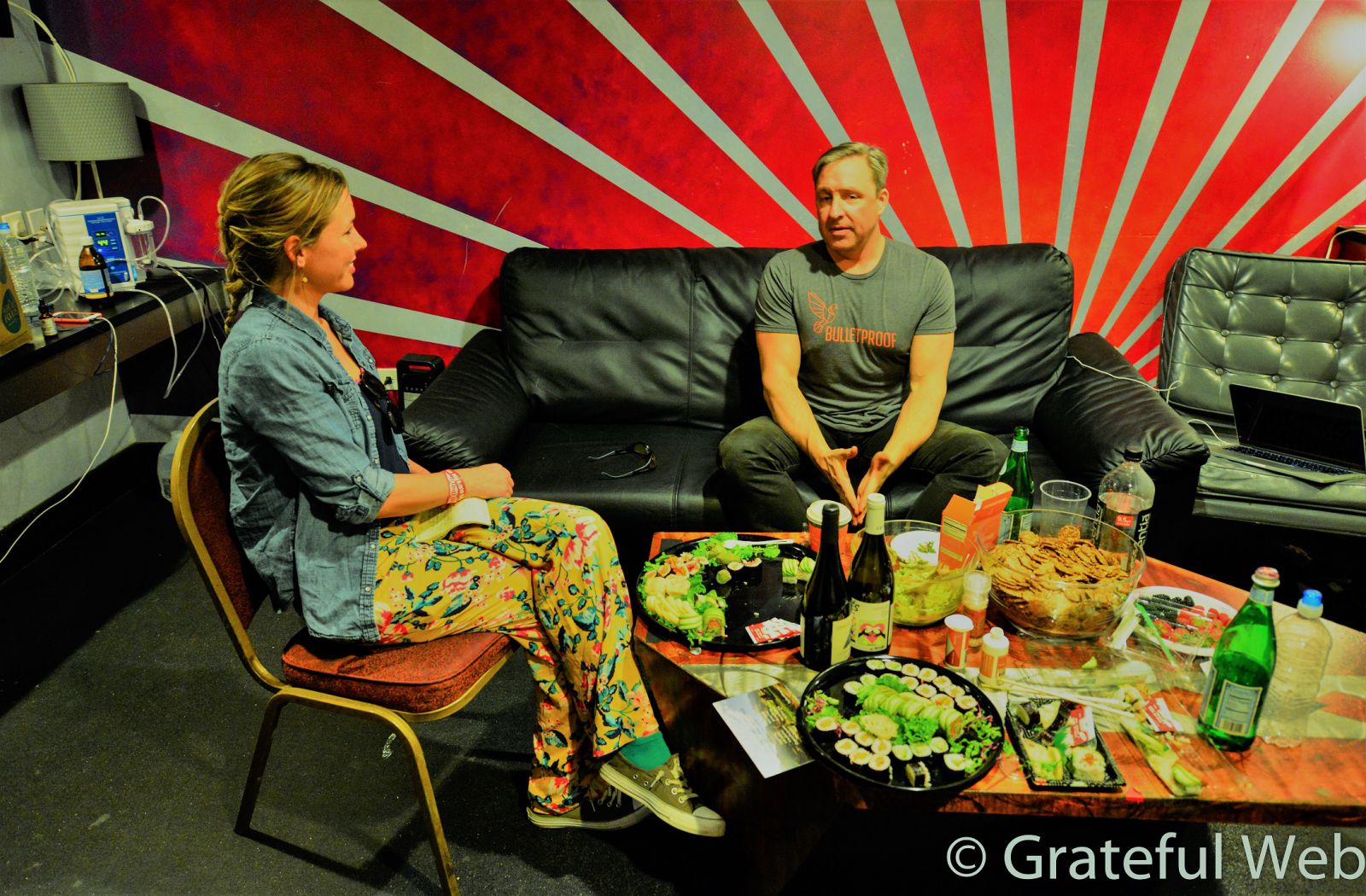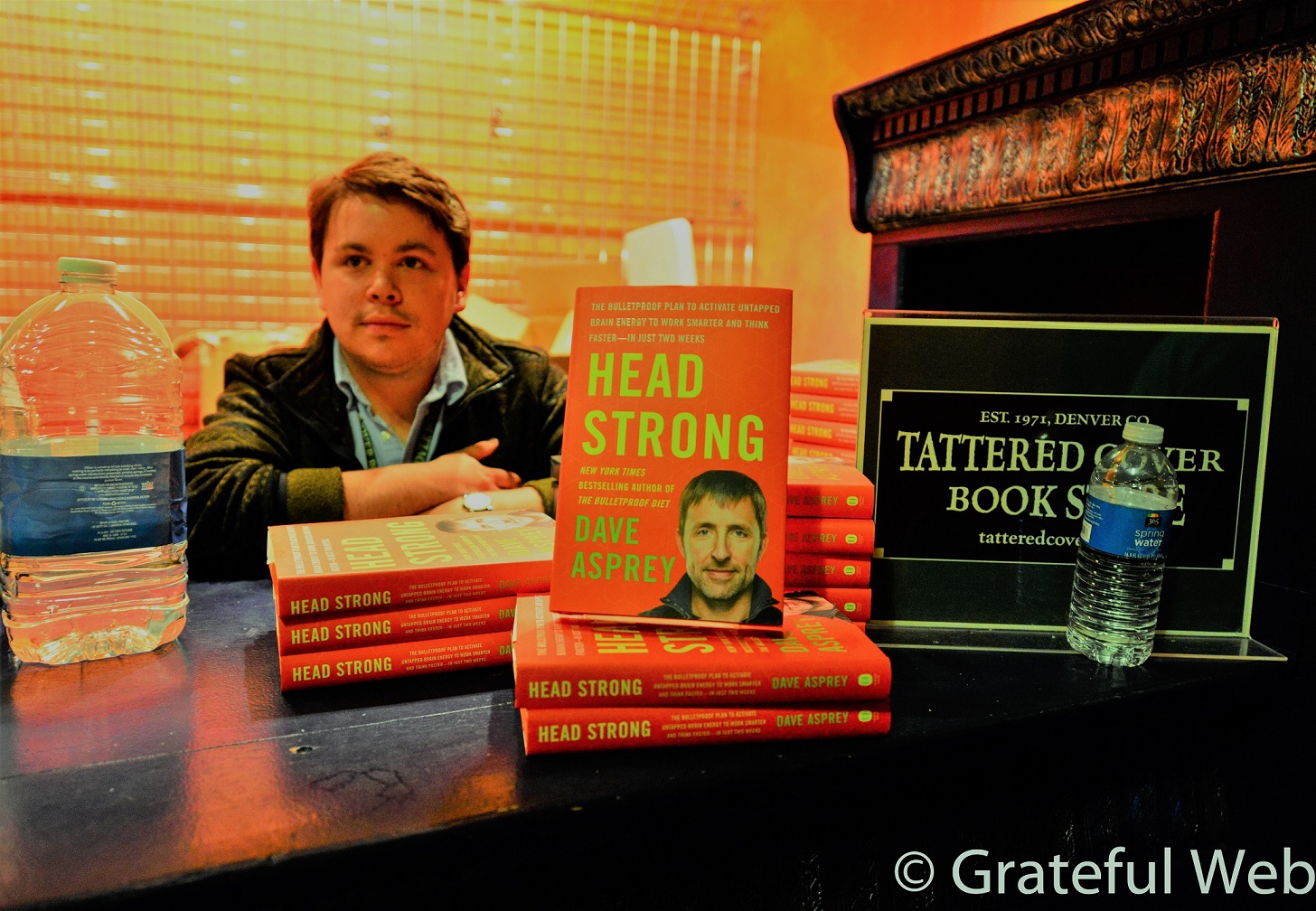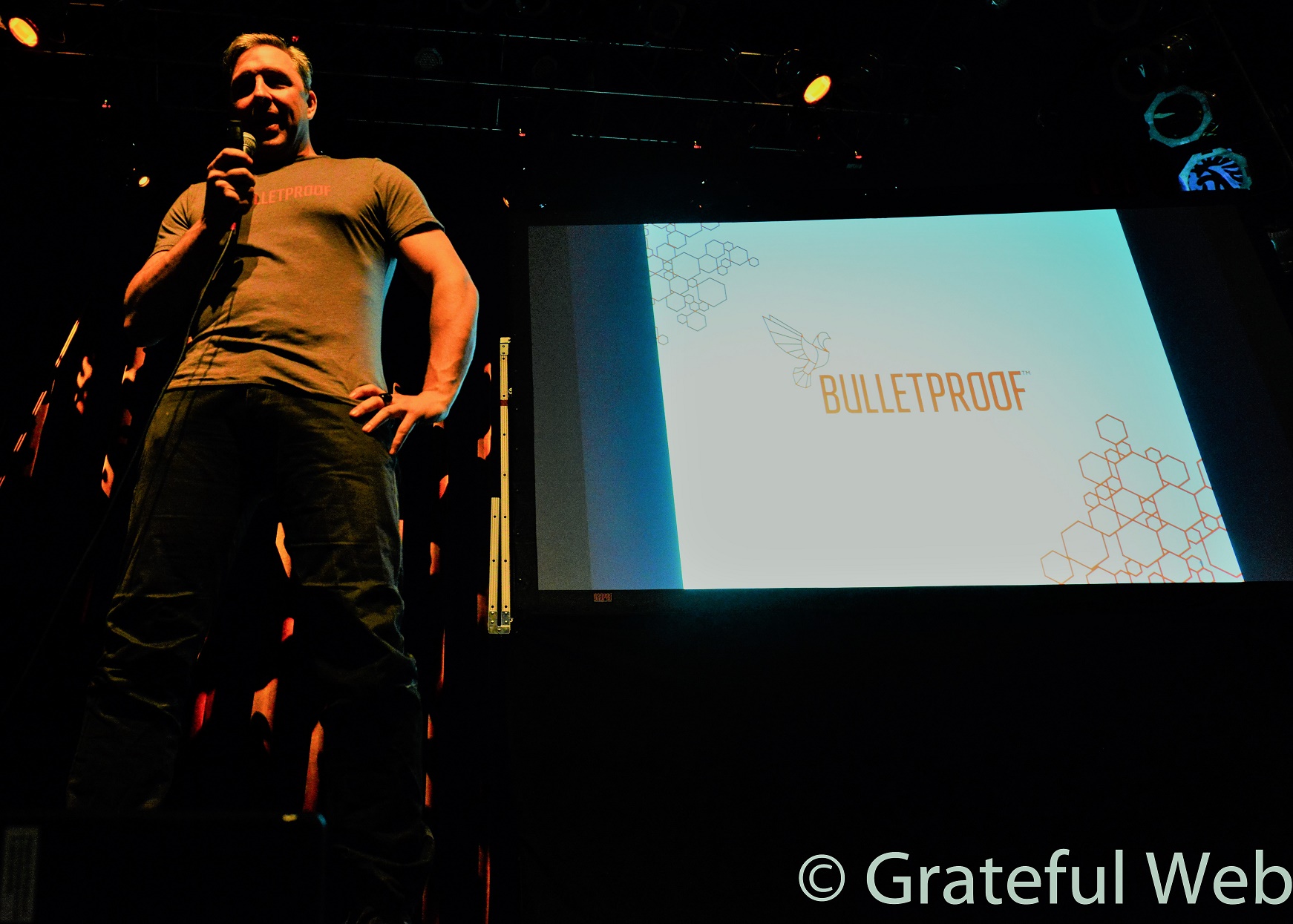As we entered the Gothic Theatre on April 19, we were handed copies of Dave Asprey's newest book, Head Strong, along with cups of Bulletproof Coffee and samples of his new grass-fed collagen bars, both equal parts satisfying and delicious. Head Strong and his previous book, The Bulletproof Diet, are both New York Times bestsellers.

I'll admit, I was slightly nervous as I was escorted backstage to meet Dave. I've been listening to his highly informative podcast The Bulletproof Executive for years, oftentimes while drinking his signature, highly effective, butter and coconut oil-infused Bulletproof Coffee, and I hold his dietary advice, entrepreneurship, and hard work in high regard. Dave is today's most prominent biohacker; he's spent over a million dollars conducting experiments on his own body in search of the ideal lifestyle to achieve one's maximum potential for health, happiness, and productivity. His first book, The Bulletproof Diet, is an atlas for those looking to improve their body's performance both mentally and physically, placing heavy emphasis on the importance of healthy fats, grass-fed and humanely raised meat, and restricting carbohydrate intake. His job is literally to be a mental badass, and he has been interviewing high profile doctors and scientists for over a decade. Upon meeting him, however, his warmly calm demeanor doubled my enthusiasm and erased any pre-show anxiety I had been feeling. His backstage setup was strikingly different from the rock shows I am used to, with healthy snacks adorning the tables and a massive platter of sushi in the middle of the room. The conversation we engaged in was of course exceptionally unique as well.

The interview kicked off with me asking Dave if he ever takes a day off from being "bulletproof,' as his diet philosophy is quite rigorous. He smiled as he responded that it's gotten so much easier over the years via consistency and determination; his body is so well trained, and he's become so attuned to listening to his body that the sugar cravings, mood swings, and eagerness to self-medicate have all but vanished. He also informed me that he had only gotten about fours hours of sleep the night previous, as he was visiting with a colleague and may have imbibed a few glasses of wine...but he was feeling great and looking radiant, and chalked it up to his daily regiment. Occasionally, he concluded, it's perfectly fine to break a dietary rule. If you do reach for that beer or ice cream cone, it's important to not beat yourself up over it. When we feel guilt or shame while we're eating something "bad," it creates stress and interferes with the digestion process. Self-love is an essential element of overall wellness.

Dave meditates for about an hour and a half a day and often sings the praises of its broad spectrum of benefits, everything from improved decision making to increased patience to heightened bodily awareness. "Basically, meditation can help you feel sharp, stay calm, learn new things, and stop being a jerk. It's no surprise, then, that research shows that meditation can improve your relationships and make it easier to achieve your life goals," he states in Head Strong. What's not to love about that?

I got the opportunity to ask a question that my partner and I frequently discuss over dinner: is it better to eat non-organic meat, or no meat at all? The answer was emphatically pro-organic, and he stated he wouldn't eat conventionally raised meats if that was his only option. Citing his reasons why, he mentioned the hormones and antibiotics are terrible for our bodies, and that factory farming is deeply inhumane, and my partner added the element of the animal’s energy as well, which Asprey nodded in agreement.

Since it was Bicycle Day (a date commemorating Albert Hoffman's discovery of LSD; it kicked in while he was riding his bike home from the lab) and Dave is intrigued with the positive benefits of microdosing in regards to heightened cognitive function, we talked about psychedelics. Before offering his opinion, he made sure to state that he doesn't necessarily endorse the use of illegal substances, but, if we were in a country where it is legal, he thinks it would be a safe brain hack for improving productivity and creativity. About one tenth of a hit of clean LSD obtained from a reliable source is one microdose. I mentioned I used to be prescribed Adderall and microdosing helped me stop taking my medication better than any other method I'd tried. Upon hearing this, he mentioned that he's found a new product that gives him that "Adderall burst," mentioning that nicotine is the most effective legal nootropic that we know of. Nootropics are substances that are also called "smart drugs" or cognitive enhancers;" caffeine is an example. He pulled out a small spray bottle of liquid Nicorette and explained that this hasn't been technically approved to be sold in the US, though it is available for purchase on Amazon. He administered one squirt on my tongue, and I felt the lifting effects almost instantly.

His talk centered around mitochondria, the energy-producing Energizer Bunnies of our cells. Our bodies at any given time contains about one quadrillion of them, comprising about 10% of our total body weight, and they're in charge of most of our bodily functions. These mitochondria, he says, are highly perceptive and exhibit emergent behavior. Your mind works with them, and when someone is feeling stressed or anxious, the mitochondria pick up on that and dictates your body's vibe and instincts. Mindfully managing your mitochondria enables them to create energy more efficiently, therefore enabling your body and mind to perform at a higher level, and feel good while doing it. Ways to work with your mitochondria include avoiding unnecessary EMF's (turn your wifi off while you sleep at night, don't carry your cell phone in your front pockets), getting the highest quality sleep you can manage (blackout curtains can help one get a more thorough and satisfying night's sleep) and intense exercise, even if it's only going all-out for fifteen minutes a week. "Your weaker cells will die, so let them. Kill the weak! Make room for the strong!"

Dr. Izabella Wentz, a highly esteemed pharmacist who recently relocated to Boulder with her husband, spoke about her new book, Hashimoto's Protocol, before Dave's talk. Dave joked about Dr. Wentz's book being one ranking above his on the New York Times bestseller list as he introduced her. We chatted briefly backstage before she went on, giving me the opportunity to ask her which aspect of one's lifestyle, in her opinion, is most important for achieving overall wellness. "Nutrition. Nutrition and supplementation," she answered, explaining that going gluten-free and dairy-free while dramatically cutting back on sugar intake changed her life. As far as supplementation goes, she recommends magnesium, vitamin B complex, vitamin D, and high-quality fish oil as some of the most important nutrients to take. During her talk, the audience learned that about 27% of the population has Hasimoto's (a disease of dysfunction of the thyroid gland) but that only 3-5% are diagnosed, that Hashimoto's doesn't appear on a standard thyroid test, and is most often misdiagnosed as a multitude of other conditions that include chronic fatigue syndrome, obesity, and depression. Dr. Wentz recommends an annual in-depth thyroid test.

The tour has concluded, but the mission has not. We are fortunate to have people like Asprey to direct our dietary health and expose those that are poisoning us on a daily basis. Pick up a copy of their books and take control of your lives as soon as you can. It is amazing what one can accomplish when they feel healthy and full of energy.











